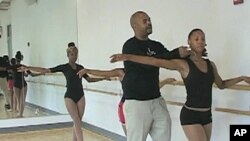Professional training in dance is often out of reach for children in low-income urban communities.
Fabian Barnes, a former dancer with the acclaimed Dance Theatre of Harlem, started his own school to change that.
He offers summer classes - often free of charge - to students with talent and passion.
Providing inspiration
Barnes inspires young dancers to dream big
Every summer, the Dance Institute of Washington welcomes young people from across the city to train with professional dancers.
Barnes developed the program. His own experiences in dance changed his life - vaulting him out of the northwest city of Seattle and onto the most famous stages in the world.
Most students in the program receive scholarships, based on financial need. Barnes says he started the program with inner-city students in mind.
"Traditionally those kids don't have the opportunity to have a formal experience in a dance institution, in a dance academy," he says.
Discovering a passion for dance
Barnes grew up in an urban neighborhood where dance academies were mostly out of sight and out of reach.
He was 11 when he discovered his passion for dance. He says he sees a lot of himself in his students.
"My only experience was that dance was the thing that actually helped to shape my life and helped shape my destiny," he says. "So I saw the same thing in these young people that, 15 years earlier, would have probably been me."
From nine in the morning until four in the afternoon, the school pulsates with music and vibrates with movement.
Getting a move on
While some of the older students have their eyes on a career, the younger ones just like to move. Many of these young dancers come back year after year.
"I've been doing dancing for a long time, since I was 5 years old," says one student, who adds that dance makes her feel happy and tired.
Barnes knows many children are drawn to dance because it feels good. But he says the benefits run deeper. Discipline and determination are integral to dance.
"It's like practicing and practicing and practicing until you get it right. It is a skill and it's something that you can do with any avenue. You can do it in the studio. You can do it with a paper that's due. You can do it with a home improvement project. You just chip away at it until you're finished."
Meeting other needs
Many of the students have needs beyond the studio. So the program offers conflict resolution and nutrition classes.
And Rene Williams White, a senior vice president of Sun Trust Bank, teaches the dancers about money.
"It's really important to talk about financial literacy for every community, particularly for communities where the kids are underserved," says Williams White. "That they understand that money isn't the end all be all but it's a way to help them achieve some of the things that want to achieve."
Barnes has been offering a summer of movement since he launched the Washington program more than 20 years ago. Looking back, he's proud of his achievements.
"The best feeling for me personally about dancing at this point, at this side of the fence, now that I'm not a professional dancer, is to see the power that it has to change young people's lives the same way it changed my life."




